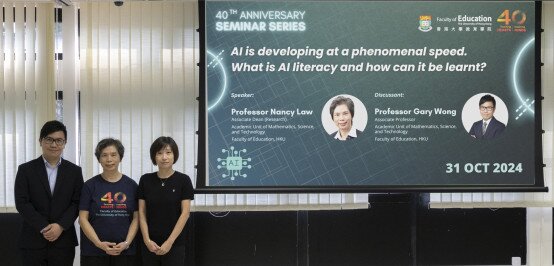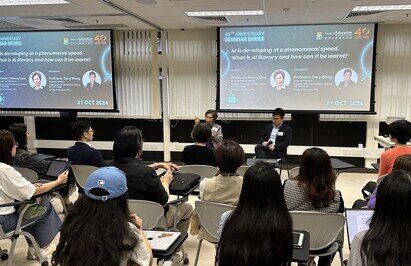Press Release: HKU Faculty of Education organises the 40th Anniversary Seminar Series – “AI is developing at a phenomenal speed. What is AI literacy and how can it be learnt?”
新聞稿:香港大學教育學院舉辦四十周年研討會系列 —
「什麼是人工智能素養?人工智能急速發展的情況下,我們應如何學習和面對?」
Updated on November 01, 2024 (Fri)
HKU Faculty of Education organises the 40th Anniversary Seminar Series –
“AI is developing at a phenomenal speed. What is AI literacy and how can it be learnt?”
The Faculty of Education at The University of Hong Kong (HKU) hosted the seminar, entitled “AI is developing at a phenomenal speed. What is AI literacy and how can it be learnt?” yesterday (October 31). This seminar, as part of the Faculty’s 40th Anniversary Seminar Series, was delivered by Professor Nancy Law, Associate Dean (Research) of the Faculty. It attracted over 300 participants from various countries and backgrounds joining online and offline, including educators, students, and community members.
The event commenced with opening remarks made by Professor Lo Yuen Yi, Associate Dean (Learning & Teaching) of the Faculty. She welcomed attendees and gave an overview of the Faculty’s long history and contribution to education. “This year marks the 40th anniversary of our Faculty, but our roots trace back to 1917 when we started as a department in the Faculty of Art,” Professor Lo said. “Over time, we have grown into a cosmopolitan faculty with a diverse mix of students and staff. We remain dedicated to making a positive impact locally, regionally, and internationally through our partnerships and collaborations.”
In the seminar, Professor Nancy Law provided a review of the history of internet search technology, starting from directory-based, human-crafted search engines to PageRank-based Google search. She highlighted that these changes in internet search technology not only bring new possibilities but also impose new requirements on digital literacy. Professor Law emphasised the importance of AI literacy in education and its implication for learning. She stated, “I would say that AI literacy should be learned through authentic inquiry integrated across the curriculum, and not as a standalone subject.” She discussed how technological advancements have historically shaped literacy requirements, and urged educators to adopt curricula that reflect these shifts. “So pedagogical design is the key. There is a way for our curriculum to co-evolve with a changing social and technological context. This approach not only makes learning more relevant but also prepares students for the complexities of the digital age,” said Professor Law.
Professor Law outlined the expected learning outcomes for students, which include gaining foundational knowledge of AI technologies, developing skills to utilise AI applications ethically, and fostering critical evaluation of AI tools. She showcased successful examples from local schools where AI literacy was embedded into various subjects, enhancing students’ critical thinking, problem-solving, and collaborative skills. She underscored the importance of preparing educators to navigate these developments effectively, ensuring that teaching practices keep pace with technology.
Professor Nancy Law also discussed the current cascade model of curriculum development and teacher training, describing it as top-down and insufficient for rapidly evolving technological landscapes. She highlighted its limitations in fostering integration across subjects and restricting the creativity of teachers and students. To foster innovation and adapt to the dynamic nature of technology-related curricula, Professor Law suggested that a more flexible model is needed.
Following the presentation, Professor Gary Wong, Associate Professor of the Faculty’s Academic Unit of Mathematics, Science, and Technology, moderated the Q&A session. The audience raised thought-provoking questions, including inquiries about the potential for AI to replace teachers. Professor Nancy Law offered a visionary perspective. Her view is that any job, whether in teaching or other professions, which can be clearly specified in terms of contextual settings and the sequence of actions, will be replaced by machines sooner or later. Instead, she suggested that teachers should look for ways to offload whatever machine accomplishable work they are doing to AI/teaching robots, leaving them the capacity to act as coaches, supporting students to excel and perform better. She stressed the role of teachers as learning designers, creating environments that facilitate student learning. Moreover, she underlined the importance of humanity in education, emphasising that machines should complement and enhance human capabilities rather than replace them.
About the 40th Anniversary Seminar Series
The year 2024 marks the 40th anniversary of the Faculty of Education at The University of Hong Kong. The 40th Anniversary Seminar Series offers a historical narrative and a perspective on education that connects the Past, Present, and Future. The works of the Faculty are closely linked to the global community of educational research, while at the same time deeply rooted in Hong Kong local society. The seminar series will cover the major themes of research in the Faculty including Language Education, Early Childhood Education, Speech and Hearing Sciences, Information Technology, International and Comparative Education, and more.
For media enquiries, please contact Ms Cheryl Cheung, Senior Manager (Development and Communications), Faculty of Education, HKU (Tel: 3917 4270 / Email: [javascript protected email address]).
November 1, 2024
香港大學教育學院舉辦四十周年研討會系列 —
「什麼是人工智能素養?人工智能急速發展的情況下,我們應如何學習和面對?」
香港大學(港大)教育學院昨日(10月31日)舉辦主題為「什麼是人工智能素養?人工智能急速發展的情況下,我們應如何學習和面對?」的研討會。是次研討會是教育學院四十周年研討會系列之一,由教育學院副院長(研究)羅陸慧英教授主講,吸引超過300名來自不同國家和背景的人士在線上和線下參與,參加者包括教育工作者、學生和社區人士等。
活動由教育學院副院長(學與教)盧婉怡教授的致辭揭開序幕。盧教授歡迎各參加者並概述學院在教育方面的悠久歷史和貢獻。她表示:「今年是本學院的四十周年,但我們的根基可追溯至1917年。當時我們還是文學院的一個學系,現已發展成一個多元化的學院,擁有來自不同背景的學生和教職員,我們將繼續致力透過夥伴關係和合作,在本地、區域及國際上發揮積極的影響力。」
在研討會上,羅教授回顧了互聯網搜尋技術的發展歷史,從以目錄為基礎的人工搜尋引擎,到以網頁排名為基礎的谷歌搜索,她強調互聯網搜索技術的變化不僅帶來了新的可能性,也對數位素養設定了新的要求。她指出人工智能素養在教育上的重要性及其對學習的影響。羅教授表示:「我認為人工智能素養應該透過真實的探究來學習,並整合到整個課程的學習中,而非作為一個獨立的科目」。她指出科技進步如何在歷史上塑造了素養要求,建議教育工作者調整課程以反映這些變化。她補充道:「因此,教學設計是關鍵,應尋求一種方法可以讓我們的課程與不斷變化的社會和科技背景共同發展,這方法不僅使學習更具相關性,而且讓學生為應對數位時代的複雜性做好準備」。
此外,羅教授概述了學生應達到的預期學習成果,包括掌握人工智能技術的基礎知識、具備合乎道德地運用人工智能的能力,以及擁有對人工智能工具的批判性評估能力。她展示了本地學校的成功案例,這些學校將人工智能融入各科目,提升了學生的批判性思維、解決問題和協作能力。她強調教育工作者必須為有效掌握這些發展做好準備,以確保教學實務與科技同步。
羅教授亦解釋了目前由上而下的課程發展和教師培訓的層遞模式,不足以應付快速發展的科技環境。她指出這種模式在促進跨學科融合的局限性,妨礙了教師和學生發展創造力。有見及此,羅教授建議需要採用更靈活的模式,以促進創新,並適應與科技相關課程的動態性質。
研討會結束後,教育學院數學、科學與科技學部的黃家偉教授主持了問答環節。參加者提出了引人深思的問題,包括有關人工智能取代教師的可能性。羅教授的觀點是,無論是教學還是其他職業,只要工作可以明確定義背景設置和行動順序,遲早都會被機器取代。她建議教師可尋找方法,把機器可完成的工作交予人工智能或教學機械人,然後讓教師充當教練,協助學生發揮所長和成長。她指出教師的角色是學習設計者,創造有利於學生學習的環境。此外,她強調人性在教育中的重要性,機器應為輔助人類加強能力,而非取代他們。
有關四十周年研討會系列
香港大學教育學院四十周年研討會系列提供有關教育的歷史敘述和視角,連接過去、現在和未來。學院一直致力於全球教育研究工作,同時亦深深植根於香港社會,貢獻社群。研討會系列將涵蓋學院的主要研究主題,包括語文教育、幼兒教育、言語及聽覺科學、資訊科技、國際及比較教育等。
傳媒查詢,請聯絡香港大學教育學院高級經理(發展及傳訊)張俊瑜女士(電話:3917 4270 / 電郵︰[javascript protected email address])。
2024年11月1日


